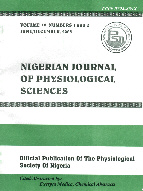
|
Nigerian Journal of Physiological Sciences
Physiological Society of Nigeria
ISSN: 0794-859X
Vol. 33, No. 1, 2018, pp. 17-23
|
 Bioline Code: np18003
Bioline Code: np18003
Full paper language: English
Document type: Research Article
Document available free of charge
|
|
|
Nigerian Journal of Physiological Sciences, Vol. 33, No. 1, 2018, pp. 17-23
| en |
Effect of Chronic Caffeine Consumption on Cardiac Tissue Metabolism in the Rabbit
Nabofa, E.W. & Alada, A. R. A.
Abstract
Summary: Previous studies on the ability of caffeine to enhance endurance and boost performance have focused on the energy substrates that are utilized by the skeletal muscle and the brain but nothing of such has been reported on cardiac tissue. This study was designed to investigate the effect of caffeine on cardiac tissue metabolism in the rabbit. The study was carried out on adult male New Zealand rabbits divided into 3 groups (n=5). Group I rabbits served as control and were given 0.5ml/Kg of normal saline while group II and III rabbits were administered with 2mg/Kg and 6mg/kg of caffeine respectively for 28 days. Blood samples were collected by retro orbital puncture for biochemical analysis. Animals were sacrificed by cervical dislocation and cardiac tissue biopsies were collected for biochemical and immunohistochemical analysis. Cardiac tissue glycogen concentration was determined by anthrone reagent method. Cardiac tissue CPT 1 activity and cAMP concentration were determined by immunohistochemistry and colorimetry techniques respectively, with assay kits obtained from Biovision Inc. The results showed that Caffeine at 2 and 6 mg/kg significantly inhibited MPO activity from 0.72±0.05 to 0.164±0.045 and 0.46±0.12 U/L respectively (p<0.05). Caffeine at 2mg/kg had no effect on serum nitric oxide but at 6mg/Kg, it significantly increased serum nitric oxide form 28.01±6.53 to 45.25±3.88μM of nitrite (p<0.05). Also, Caffeine at 2 and 6mg/kg increased cardiac tissue glycogen from 15.62±0.73 to 40.69±6.35 and 38.82±6.91mg/100g respectively and carnitine palmytol transferase 1 activity from 18.3 to 20 and 25.2% respectively. In conclusion, the study showed that caffeine consumption increased CPT 1 activity suggesting increased utilization of free fatty acids for energy metabolism and sparing of cardiac tissue glycogen by mechanism(s) which probably involved blockade of A1 adenosine receptors and cAMP signaling pathway.
Keywords
Caffeine; Cardiac tissue metabolism; Rabbit
|
| |
© Copyright [2018] - Physiological Society of Nigeria
|
|
